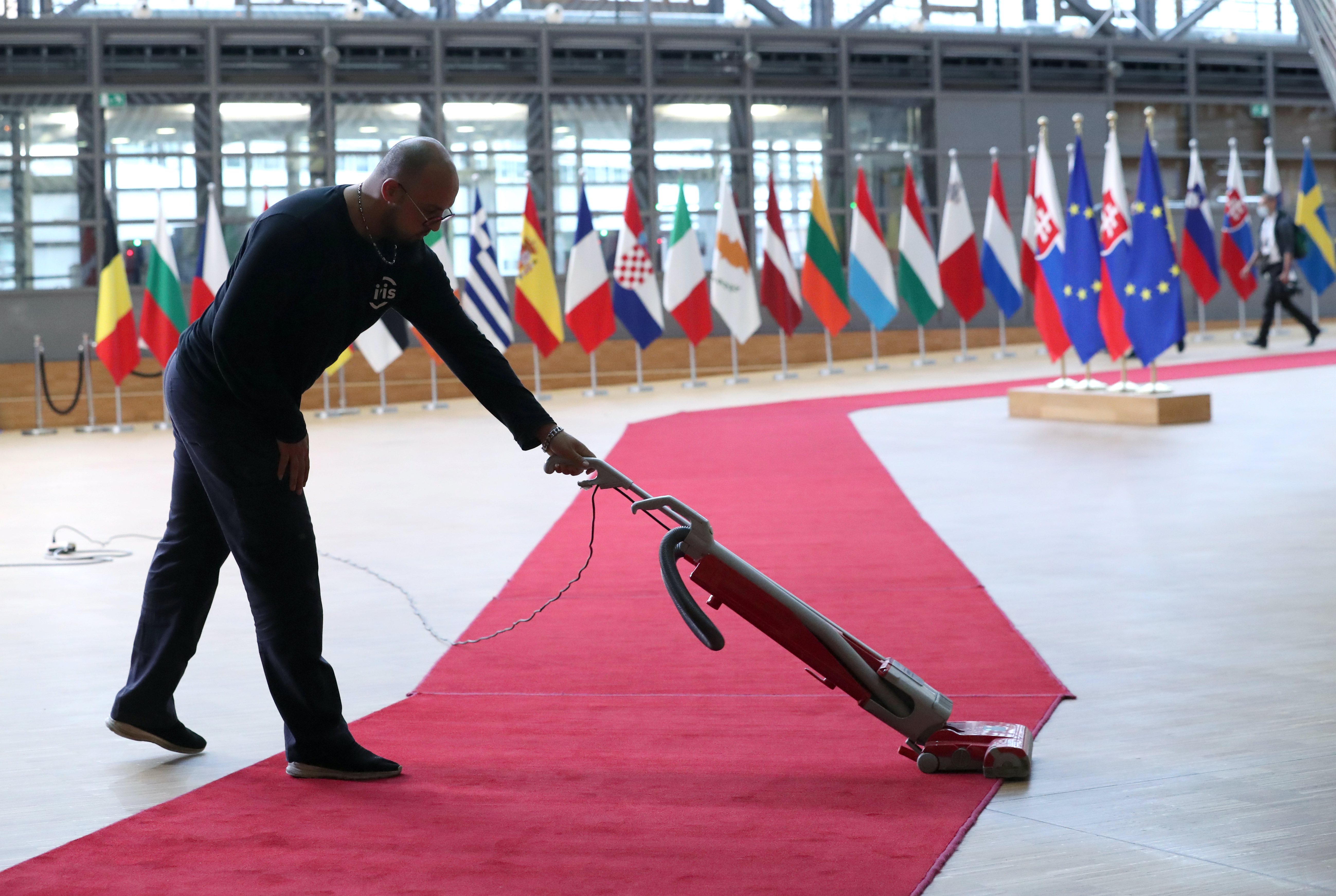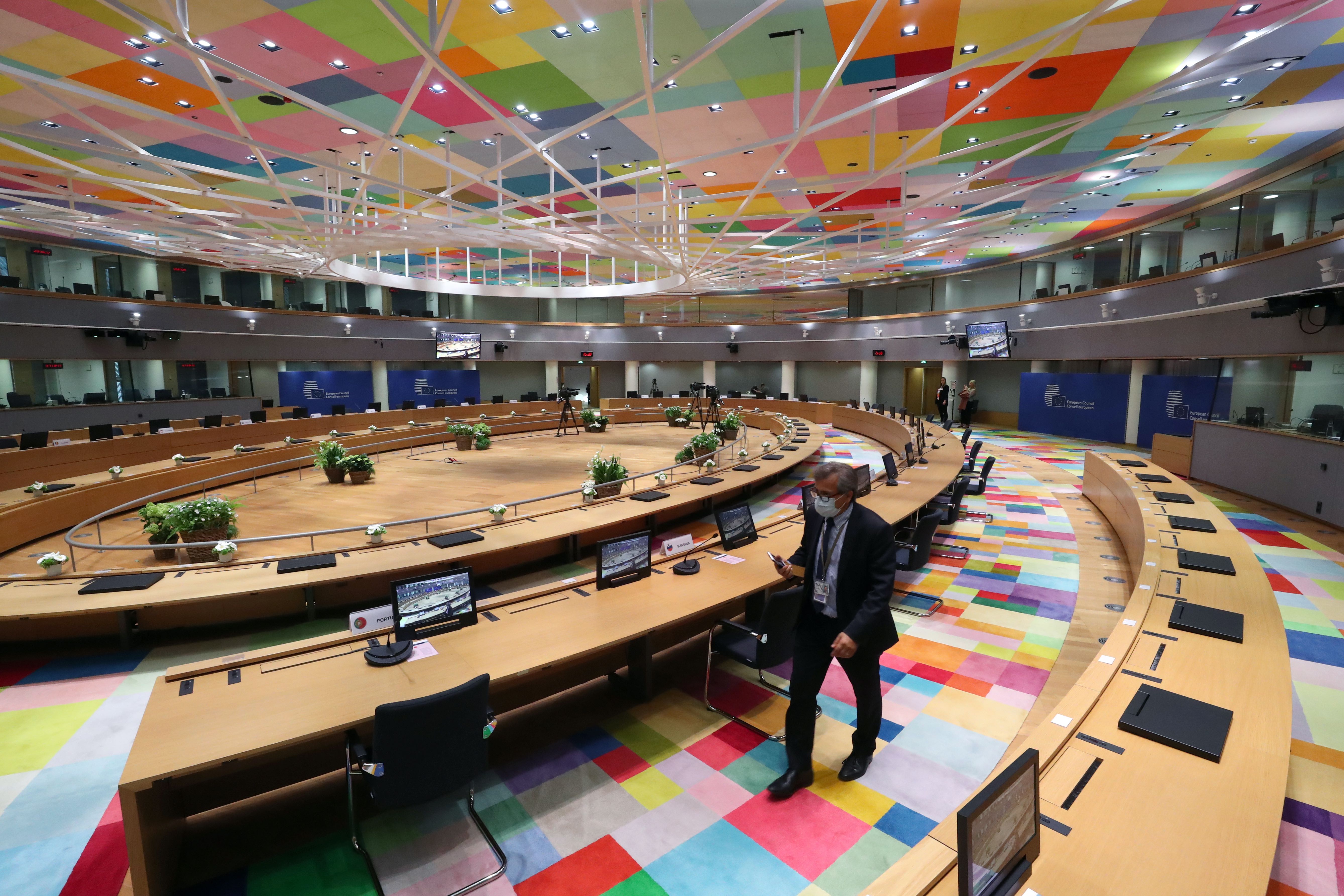Despite COVID-19, EU leaders gather to divvy up $2.1 trillion
In perhaps the first major meeting of leaders since the outbreak hit, the stakes were too high not to meet face-to-face.

There are limits to videoconferencing: When there is a lot of money at stake, people like to look each other in the eye.
So, on Friday, leaders from 27 European Union nations will be meeting face-to-face for the first time since February – despite the dangers of the coronavirus pandemic – to try to divide up a potential package of 1.85 trillion euros ($2.1 trillion) among themselves, and, just as importantly, to see who will pay in the most.
Keep reading
list of 4 itemsMexico’s teachers seek relief from pandemic-era spike in school robberies
‘A bad chapter’: Tracing the origins of Ecuador’s rise in gang violence
Why is the US economy so resilient?
In perhaps the first such major meeting of leaders since the COVID-19 outbreak hit the world, the stakes were just too high to maintain extreme physical distancing.
“You can feel the mood, as it were,” Germany’s Europe minister, Michael Roth, said of such flesh-and-blood summits. “I wouldn’t claim to be a psychologist, but I would say it really does help.”
It better had since five remote video summits so far this year failed to bridge the financial gap between rival nations needing to agree on a more than one-trillion-euro ($1.14 trillion) budget for the next seven years and a 750-billion-euro ($856bn) fund to allow nations recover from the coronavirus crisis.

“It was already clear at Easter when I was calling, the first time, all the different capitals, that such a decision can only be taken if the leaders, prime ministers, heads of state, meet in person in Brussels,” EU Budget Commissioner Johannes Hahn said.
French President Emmanuel Macron swept into town late on Thursday already, eager to get in as many encounters as possible. German Chancellor Angela Merkel will wait until the official kick-off time early on Friday.
Whatever happens, it will make for an EU summit unlike any other at the urn-shaped Europa headquarters.
They will be well spaced.
For starters, the cosy meeting room on the top floor, where the leaders have clashed at close quarters over everything from Brexit to migration issues, will be exchanged for the prosaically-named meeting room EBS-5, where normally 330 people fit in a space of 850 square metres (9,150 square feet).
“They will be well spaced” when they go into a restricted session with barely a few delegates, deadpanned an EU official preparing the summit.
There will be no group photo of the leaders like at last December’s summit because of physical distancing requirements.
Often, the toughest of summits have so-called confessionals where the president of the proceedings takes one or more leaders to the side to see where they might budge. Other leaders can gather in mini-sessions to defend common regional or financial interests.
It is bound to happen again, but this time, every room which will be used at the summit centre will be deep-cleaned. The main summit room will only use filtered, non-recycled air.

As soon as their vehicles pull up into the driveway outside the Europa building, the leaders will immediately experience the difference, officials said. Most of their delegations will be split off immediately and parked in an adjacent building. And instead of a warren of microphones and cameras seeking early comment, they will have the option to make a comment to a neutral outlet, no questions asked.
The already byzantine map of the building has been redrawn to avoid unexpected crowds and certain elevators for the leaders will be limited to a maximum capacity of two.
At the start of a session, leaders will be urged to mask themselves and respect at least 1.5 metres (4.9 feet) of distance for the informal greetings, often a moment when body language gives away how tough a summit will be. Yet, if Monday’s trial run of foreign ministers was anything to go by, discipline was often lacking.
Should the worst happen and a leader suddenly shows symptoms, doctors will be on site once he or she is taken out of the room. A nation cannot put in a replacement, and it can only ask a friendly colleague to vote or speak in its place.
So, even if it will be a true face-to-face meeting, it will be one laden with provisos.
“It doesn’t automatically mean that excellent results will be achieved and that agreement will be reached quickly,” Roth said. “But after all, I am an optimist.”
Others are already looking at an extended summit running even into Sunday, with another one possible within two weeks.